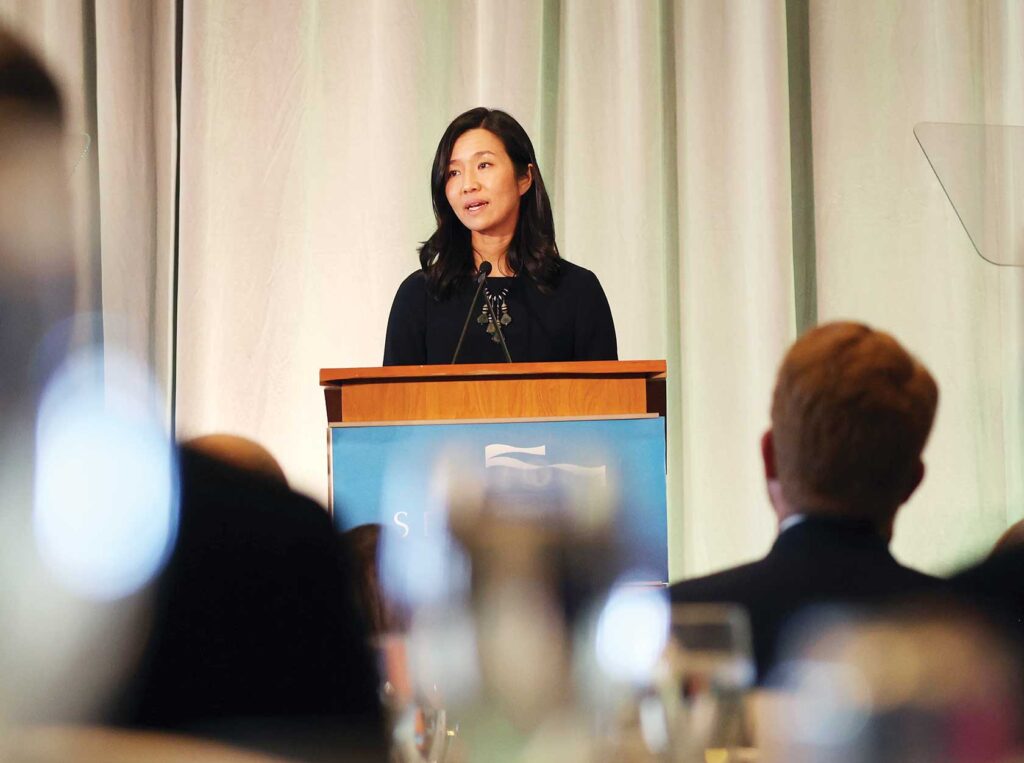Wu calls for investments in youths
City will fund jobs, sports, arts for children

Mayor Michelle Wu last week outlined an ambitious agenda to support the city’s young people, pledging investments in early education, arts and sports programming, youth jobs and other key areas in a speech at the annual meeting of the Boston Municipal Research Bureau.
“We’re committed to ensuring that every young person has the resources and opportunities to explore their neighborhoods, connect with their communities and pursue their passions,” Wu told the business and civic leaders in a banquet hall at the Seaport Hotel on March 9. “That means safe housing, high quality education and child care, and fresh, nutritious food for every child must be our starting blocks, not our finish line.”
During her speech, Wu outlined several key policy initiatives aimed at improving outcomes for the city’s children, including recruiting 800 new early-education workers, providing free swimming lessons for all Boston children through YMCA branches, opening three Boston Centers for Youth and Families swimming pools and free biking clinics for Boston children.
The mayor said the initiatives will support five goals: that every child will have the opportunity to learn how to swim, ride a bike, play a sport, connect with the arts and learn gardening.
“In the years ahead, we’ll build and expand on these initiatives to ensure our youngest residents in every neighborhood have the resources and opportunities to thrive,” Wu said.
Wu’s announcement comes amid an uptick in youth violence in Boston and across the nation. Abrigal Forrester, executive director of the Center for Teen Empowerment, said young people in the city have been facing particularly challenging times since the beginning of the COVID pandemic.
“There’s a lot that happened over the 24 months of isolation that needs to be addressed,” he said. “Children have more mental health issues.”
Wu told the BMRB audience that she will in the coming weeks be announcing partnerships to train a diverse pool of mental health clinicians as well as recovery coaches and other non-clinical workers.
“We’ll support 200 Boston residents pursuing careers in behavioral health, placing the folks we train in neighborhoods across our city, with a particular focus on youth in communities of color, LGBTQ+, immigrant and historically marginalized communities,” she said.
To bolster sports programs, Wu said her administration is planning to survey families and caregivers to determine how young people become involved in sports and conduct an audit of the city’s sports facilities with an eye toward increasing staff levels, constructing new facilities and renovating existing ones. She appealed to the audience for help with youth sports.
“We’ll need support from the people in this room — everything from spaces where our kids can play, to members of your workforce eager to dust off their cleats and mentor the next generation of Boston’s champions,” she said.
Wu also appealed to the business community and nonprofit leaders to help expand the city’s jobs program, noting her administration found employment for a record number of teens last summer.
This year, the city plans to award over $13 million to more than 50 Boston-based nonprofits to hire teens, an effort expected to create employment for 5,000 youth. Additionally, the city of Boston is planning to create summer jobs for 2,500 teens.
The mayor also underscored her administration’s investments in Boston’s schools, including the $2 billion Green New Deal initiative to build new schools and renovate existing ones and the expansion of the number of so-called inclusion classrooms — those in which students with special needs are educated alongside general education students.







